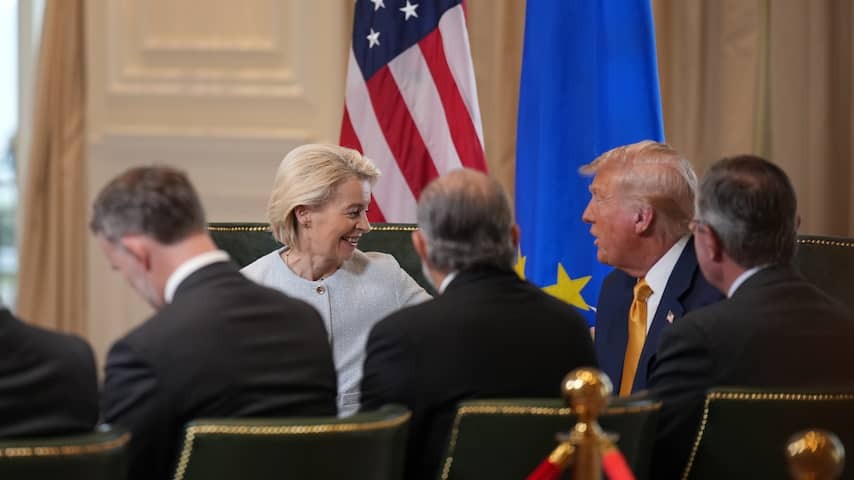
The trade agreement between the European Union and the United States may take a bite out of exports. It also slows economic growth, and companies are in trouble if they don’t make unique products. For the consumer, the damage is likely to be limited.
Brussels and Washington agreed on Sunday that the US may impose a levy of 15 percent on almost all European goods. This means that products from the EU will become more expensive for Americans, who may therefore opt for American alternatives more often.
That affects us in two ways. First of all, Dutch products are becoming less popular in the US. In addition, the measures can also hurt in an indirect way. For example, Dutch companies supply many semi-finished products to, among others, the Irish pharmaceutical industry and German car manufacturers, two sectors that may be greatly affected by the US tariff policy.
Economist Jan-Paul van de Kerke of ABN AMRO expects that the trade barriers will slow down economic growth. “There may even be a quarter with a slight contraction. But a strong recession is not coming. The Netherlands has a strong labor market and corporate profits are good.”
He calls the deal “unbalanced.” The reason for this is that the European negotiating position was not strong. “We are dependent on American security and energy. In addition, the EU member states differed too much about what they wanted.”
Yet the deal also has advantages. “Dutch companies are no longer in uncertainty. They hate that,” says macroeconomist Edin Mujagic, who is a manager at investment fund Hoofdbosch. This is extra pleasant for the Netherlands, because our country trades relatively much internationally. “And now you know what you are dealing with.”
Prices in the Netherlands hardly go up
For a long time, the EU has threatened counter-tariffs if the Americans went too far. For example, there was a list of American goods worth 93 billion euros, on which Brussels could possibly introduce extra tariffs. But ultimately, Europe does not increase the tax on American goods, for fear of extra measures from the US.
This ensures that prices in Dutch stores are unlikely to rise. That’s good news for lovers of Harley Davidsons or American whiskey.
Yet Mujagic points out that there may be a price increase. Dutch companies may keep their prices for American customers somewhat lower, to prevent them from losing these customers. To compensate for those lower prices, they could increase prices for customers outside the US somewhat. It is unclear whether this will happen.
Remarkably enough, the trade war that US President Donald Trump has started can also ensure that prices in the Netherlands fall somewhat, or at least rise less sharply. The US has not only started a trade war with Europe, but with almost all countries in the world, including China.
It is possible that the Chinese are now selling products that they initially wanted to make for the American market at lower prices in Europe. However, the European Commission has already indicated that it is closely monitoring this, because it could turn out badly for European companies.
The main points from the agreement
Dutch companies with unique products are immune
Companies that make goods that are very difficult to replace are unlikely to suffer much from the levies. A well-known example of this is ASML, which produces chip machines that cannot or can hardly be copied. “But a company like Van Oord also has unique products,” says Mujagic. American customers are willing to pay that extra 15 percent to such a company.
Fortunately, according to the economist, the Netherlands has relatively many companies that make something exceptional. “The Netherlands scores high on the list of most competitive countries every year. In the past that was mainly fun, but now it is also useful.” Mujagic therefore expects that we will suffer less from the levies than other European countries.
For companies that do not supply unique goods, there is a greater risk that they will lose customers in the US, unless they lower their prices. “If you work for a company that does a lot of business with the US, your salary may not go up as quickly.”
Steel producers get the hardest blows
The grapes are the sourest for manufacturers of steel and aluminum. They have been dealing with American levies of 50 percent for some time and that remains the case. “Trump wants to protect the American steel industry against foreign competition with this,” Van de Kerke explains.
This can hurt, because the United States is an important sales market for steel from the Netherlands. For example, more than 10 percent of what Tata Steel makes goes to the US.
Interest group FME was therefore not happy with the deal, which was concluded at a time when the sector is already having a hard time. For example, steel companies have to become more sustainable, which is not so easy, and there is a lot of competition from other parts of the world. The association called the agreement concluded on Sunday a blow to the steel industry.